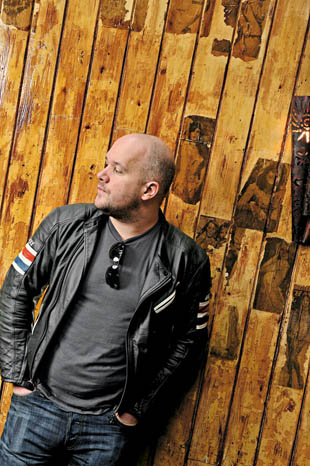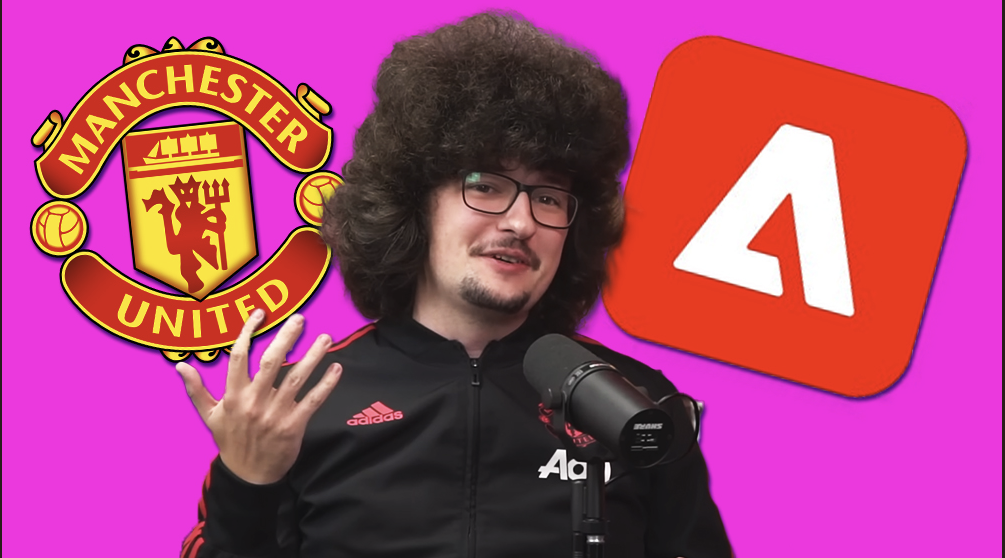James Hilton
James Hilton co-founded AKQA when he was just out of college and helped build it up to a global agency with hundreds of employees and some of the world’s biggest clients. He tells Oliver Lindberg what makes AKQA tick
Sign up to Creative Bloq's daily newsletter, which brings you the latest news and inspiration from the worlds of art, design and technology.
You are now subscribed
Your newsletter sign-up was successful
Want to add more newsletters?

Five times a week
CreativeBloq
Sign up to Creative Bloq's daily newsletter, which brings you the latest news and inspiration from the worlds of art, design and technology.

Once a week
By Design
Sign up to Creative Bloq's daily newsletter, which brings you the latest news and inspiration from the worlds of art, design and technology.

Once a week
State of the Art
Sign up to Creative Bloq's daily newsletter, which brings you the latest news and inspiration from the worlds of art, design and technology.

Seasonal (around events)
Brand Impact Awards
Sign up to Creative Bloq's daily newsletter, which brings you the latest news and inspiration from the worlds of art, design and technology.
‘Relevance’ is a word James Hilton uses a lot – over the course of an hour it crops up a good dozen times. Everything digital agency AKQA does needs to be relevant. It expanded into the US and Asia because that was where its clients were coming from. It was relevant. How does it decide which technology to use for a new project? Well, which one is the most relevant? Who’ll work on the project? The most relevant people, of course.
It’s a simple rule but it’s worked for AKQA. After 13 years in business, the company, still independent, now boasts more than 700 employees in London, New York, San Francisco, Washington DC, Shanghai and Amsterdam, and last year generated an impressive $150 million in revenue – up more than 40 per cent. Its client list includes such high profile names as Coca-Cola, Nike, Xbox and Sainsbury’s.
James Hilton co-founded AKQA with chairman Ajaz Ahmed in their early 20s and says he’s never had a proper job. Today James is one of two executive creative directors in the London office; with around 350 staff, the largest in the AKQA network. “We have to have two because there are so many pieces of work that need to be looked at,” he explains. “Since AKQA has now become a global agency, we felt that the idea of a global creative director doesn’t work. You’d have one poor guy who’s in the air all the time trying to check everything and it just becomes a bottleneck. So instead we have what we call the ‘global creative council’, which consists of all the other executive creative directors from all the other offices. We come together two or three times a year and discuss things. We’re all friends anyway. We’re always chatting to each other and trying to figure out new ways of doing things and cross-pollinating our ideas.”
Spread the word
AKQA employees travel a great deal – to “spread the DNA into all the offices”, as James puts it – and often work abroad long term. Since AKQA has got many big global clients on its roster, the company runs a number of global projects and treats his employees as a global pool of talent. “For some projects we’ll use the creative out of New York, technology out of London and consulting out of San Francisco. We all club together and find the best solutions and share the work. The learning spreads, so we don’t have to relearn everything all the time. When one office learns it, everybody’s knowledge base is going up – like the Borg! It works because everybody’s focus is on creating the most innovative, brilliant piece of work that they can.”
As a result AKQA consistently delivers innovative work and has been showered with awards over the years (a respectable 21 on FWA alone). The Flash diorama for the Xbox launch of Halo 3, for example, provides a very unique and unforgettable immersive experience and the stunning Happiness Factory for Coca-Cola doesn’t have to shy away from a comparison with Pixar.
Many of AKQA’s clients are not only very big, their reputation has been built on innovation and doing things differently. So AKQA simply adopts the attitude. The company’s four cornerstones are innovation, service, quality and thought.
Keep your heads in the clouds and your feet on the ground. Never stop being excited, never stop coming up with new ideas and never be reactive. Never just sit there waiting for the briefs to come in. Make your own briefs.
“You’re only as good as your last piece of work,” explains James Hilton. “The tie could be severed at any point in time. You’ve got to keep thinking that you’re still four guys, just out of college, who are hungry for the business and never going to stop thinking. That’s how you retain clients like Nike, Xbox, Fiat and BSkyB. It’s the only way to do it. Keep your heads in the clouds and your feet on the ground. Never stop being excited, never stop coming up with new ideas and never be reactive. Never just sit there waiting for the briefs to come in. Make your own briefs.
“The clients pay AKQA to be this hyperactive child that can’t stop being excited and bringing them brilliant solutions. We don’t actually know what it is to sit still. We don’t know what it is not to change.” This is how AKQA has managed to build up long term relationships with its clients. They’ve worked with Microsoft for 12 years, with Nike for 10 years – significant amounts of time in such a fast changing industry.
Sign up to Creative Bloq's daily newsletter, which brings you the latest news and inspiration from the worlds of art, design and technology.

When a new tool or technology comes out, AKQA is on it straight away and experimenting with it. In 2006 it became one of the first agencies to have a dedicated division for mobile (although it had already been offering mobile services for about five years). Alongside the hardcore developers, a team called Creative Research and Development plays with the likes of Silverlight, Adobe AIR and Flex – but they never just want to impress you for the sake of it. “We only use a certain technology when it’s relevant to do so,” James explains. “We’re not going to do it just because we can. If we know for a fact that there’s a 90 per cent Flash penetration in the userbase that we want to talk to, it makes perfect sense. Why go for a technology that nobody uses in that particular group? We need to make it seamless for people, so the ‘fuck it’ factor doesn’t creep in and people can’t be bothered. That’s the worst enemy out there. You’ve got to do everything you can possibly do to get rid of it.”
Partners in design
James Hilton studied design at Southampton Institute and had already dreamt up concepts for Nike before he actually worked with them. He went back to college to teach design for a few months and saw an ad in Creative Review that Ajaz Ahmed had put in to look for interactive programmers and designers. They met up, got on really well, found out they were born one day apart, and that was it. Their first client was Virgin.
There’s always a danger that designers who buy countless design books are going to take something from the book, consciously or unconsciously
So where does a creative director at one of the most innovative agencies on the planet take his inspiration from? “Personally, I get more inspiration from looking at architecture and natural systems like trees and ant colonies than I’ve ever done from looking at agency X’s work,” James replies. “The less that I know, the more creative I can be. I never want AKQA’s work to feel derivative. And there’s always a danger that designers who buy countless design books are going to take something from the book, consciously or unconsciously. I’d rather not have that. I’d rather get it from elsewhere.
“My desk has got a view over the city and St Paul’s Cathedral right in front of me. To me that’s a massive amount of inspiration. Also, I must have read Douglas Adams’ Hitchhiker’s Guide to the Galaxy about 70 times because it’s just jam-packed with ideas all the way through.”
AKQA is currently on an expansion course, facilitated by a deal with private equity firm General Atlantic. Last year it invested a reported $250 million in AKQA. Since then AKQA has started using the capital to open an office in Amsterdam and snapped up search engine marketing firm SearchRev. More acquisitions are likely to follow. “It gives us even more freedom to do what we want to do,” James Hilton explains. “The whole package gets tighter and more finely tuned. I guess when companies grow, one of the dangers is they get flabby, a bit lacklustre and they rest on their laurels a bit too much, whereas we don’t. The bigger we get, the more tuned in we are, to make sure we don’t get flabby and complacent.”
Currently, the focus is very much on desktop apps, rich internet applications that are coming off browser, which James sees as critical for the future because they’re just so much easier to build, in shorter time frames. More projects for Nike and Xbox are in the pipeline. AKQA survived the first bubble and is set to survive the second. “Lots of people talk about recession but we just never see it,” James says. “As long as you remain relevant to the population and to the clients, I can’t see the recession hitting that badly. I sound like a broken record but ‘relevance’ is a really important word. You’d be surprised how many people forget.”

The Creative Bloq team is made up of a group of art and design enthusiasts, and has changed and evolved since Creative Bloq began back in 2012. The current website team consists of eight full-time members of staff: Editor Georgia Coggan, Deputy Editor Rosie Hilder, Ecommerce Editor Beren Neale, Senior News Editor Daniel Piper, Editor, Digital Art and 3D Ian Dean, Tech Reviews Editor Erlingur Einarsson, Ecommerce Writer Beth Nicholls and Staff Writer Natalie Fear, as well as a roster of freelancers from around the world. The ImagineFX magazine team also pitch in, ensuring that content from leading digital art publication ImagineFX is represented on Creative Bloq.
